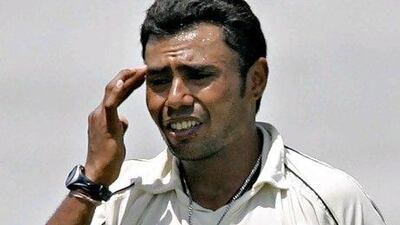Danish Kaneria's place in Pakistan cricket has always been a complicated one, the complication residing at two levels at least.
As only the second Hindu to represent a country where, frankly, minorities have not been allowed any significant status, he has always been a person of considerable interest.
To be at his peak when the team itself had become increasingly and devoutly Muslim made him even more so. (For whatever it is worth, Kaneria always insisted, privately and publicly, that his religion was no issue within the side.)
And as a leg-spinner in a country which produced pre-Shane Warne and Anil Kumble, the most fabled leg-spinner of all, he was always going to garner greater on-field scrutiny.
He did (and how!), though never did there emerge clear consensus about the opinion he was held in; not as clear as you would hope or imagine for someone who stands fourth on the list of Pakistan's highest Test wicket-takers.
On some days, particularly when heading a weak, transitional attack, he brought the comfort of familiarity, someone who would toil and toil and just not drop. On others, when you wanted him to slice through a line-up and he could not do it, he became a point of frustration.
There were times when the beauty of watching him work matched the threat he imposed on batsmen, though probably they were too few.
A personal view, a sympathetic one, was that Kaneria was in the mould of the great triers, not always bound to succeed and often left to presenting an unintentionally comic angle in his efforts to do so.
When he once tripped over a fielder and fell down just as he was taking off in celebration of the wicket, somehow that captured his on-field effect.
So too did his running when chasing a ball to the boundary, among the most identifiable on any cricket field.
That long-legged stride gathered no speed and also betrayed essentially a fat man trying to break out of the lean frame professional sport had forced upon him; in his childhood, he took to leg-spin because his chubbiness and lack of height produced such natural loop. But he never scrimped on effort.
An admission: Kaneria had become more than a subject.
He fell somewhere between friend and acquaintance so that there had developed an informal equation.
Within that, he revealed himself over years to be so earnest about his bowling, about breaking through as a limited-overs bowler, about wanting more Test wickets and to win more games, about net practice and gym sessions, even about his Essex career, that a life ban for corruption, on a personal level, has been more challenging to comprehend than the cases of Mohammad Amir, Mohammad Asif and Salman Butt.
To square the conclusion of Gerard Elias QC, chairman of the England and Wales Cricket Board's (ECB) disciplinary commission that banned him for life - that Kaneria is "a grave danger" to cricket - with what (clearly now, little) I knew of him is more difficult still.
One reason might be that the true gravity has not hit home, even now. Kaneria's case has passed by mostly in the slipstream of Lord's, as merely an appendage. It happened in a domestic game after all, unseen by most.
Then, as he fought against the Pakistan Cricket Board's (PCB) continued non-selection, compared to criminal trials his plight just did not feel big enough.
He sought advice and support from many, including the media, and clearances from various cricketing authorities and it felt like any player-board squabble, carried out on whims until it ends up in court and is duly referred back.
In actual fact, Kaneria's case could be even more significant and raise more questions than the others. Kaneria was much more established, having been in the Pakistan side more or less since 2000.
In April 2008 he had already been warned by the ICC's anti-corruption unit about the company he had kept on a tour to India.
And he had far more exposure than the trio to players who were implicated in Pakistan's first cricket corruption inquiry back in 2000. His case is scarier for what it may say about corruption within the side before the News of the World sting.
It does not feel important right now to know why he did what he has been found guilty of, but it has probably never been more important. That is not likely to happen.
He continues to protest his innocence. The fact Essex police did not press charges against him will no doubt continue to be highlighted.
He will appeal, first against the ECB's decision. Failing that, he will probably fight the Pakistan board who are bound to respect the ECB's life ban.
And if that does not work, it is not difficult imagining him taking his plight to the institution all of Pakistan looks to these days for resolutions, the Supreme Court. There is no guessing the mess that could create.
It is only left to note with some sadness that Kaneria's ban means three of the top four Test wicket-takers in Pakistan's history have been punished to some degree for corruption. It also seems appropriate to remember that Kaneria's first ball in Test cricket was a googly, his genre's ultimate choice of deception.
Follow us
& Osman Samiuddin

